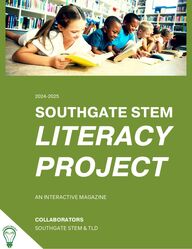
Return to flip book view
SOUTHGATE STEM LITERACYPROJECT 2024-2025AN INTERACTIVE MAGAZINESOUTHGATE STEM & TLDCOLLABORATORS
03TEACHERS AS LITERACY EXPERTS04Mission and Vision05Literacy Project Timeline 06Literacy ProjectImplementation Cycle07Module: Literacy ProjectOverview10Insert11Insert12InsertTABLE OF CONTENTS
The craft of teaching is becoming increasingly complex and nowhere is this more evident than inthe area of literacy. Effective teachers are capable of ensuring that an increasingly diverse groupof students have the literacy skills to cope with the demands of life beyond school in their careersand/or college.Literacy teaching can only be described as truly effective when it positively impacts studentlearning.Successful teachers are able to skillfully integrate a range of instructional approaches andresources to meet the diverse learning needs of their students.We can now say, with certitude, that effective teachers of literacy: Know the literacy processes and pedagogy that determine how their students learnKnow what their students need to understand and be able to do to meet the StandardsKnow their students as learnersHave high expectations for their students and encourage risk-takingFlexible use of a range of instructional practicesEngage students in challenging learning experiencesEffective literacy teachers have a deep understanding of the complexities and cumulativeprocesses of reading and writing. They also understand the developmental nature of literacylearning.Effective teachers understand that:The pathway to literacy is developmentalBecoming literate is a social process where students are active learnersStudents take individual and multiple pathways in their learningEffective teachers are aware of the complexity of a wide range of texts and the potentialchallenges these pose for students. They also recognize the sequence of events that occur withinthe classroom and how it could impact student learning. Most importantly, effective teachers knowit is not how much students know, but rather, how they apply this knowledge.Effective teachers see themselves as lifelong learners. They understand the need to continuouslyupdate their skills and knowledge in response to the changing world, new research, and emerginginformation about literacy learning and teaching.When students master foundational literacy skills, the world of learning opens for them—for life. Webelieve nothing is more important than helping young people reach their goals in school, post-secondary learning, and the careers of their choosing.3WHYTEACHERS AS LITERACY EXPERTS
VISIONThe Literacy Project is to support teachers’ effective implementation of literacyinstruction and professional learning.Commit adequate time and resources to sustained professional development.Offer multiple, varied opportunities that will provide teachers with expert supportand enable teachers to integrate knowledge with practice and feedback.MISSION teachers into literacy experts. teachers to integrate content with research-based instructional practices. student learning.MISSION AND VISION 4TRANSFORMTRANSFORM EMPOWEREMPOWER IMPACTIMPACT
LITERACY PROJECT TIMELINEOCT Module 2Data Impacton LiteracyAUGlaunch“Literacy Project”OverviewJAN Module 4High QualityVocabularyInstructionSEPT Module 1PhonologicalAwarenessNOV/DEC Module 3WordRecognition5FEBModule 5Reading &WritingConnectionMARModule 5APRModule 6LiteracyKnowledgeMAYModule 7ReflectionsLanguageComprehension
HOWLITERACY PROJECTCYCLE6Literacy ProjectImplementation cycleAPPLYLEARNREFLECTAPPLYREFLECTLEARNAPPLYREFLECTAPPLYREFLECTAdd a subheadingFirst Monday of the month a Literacy Module will bepresented. Teachers will pick a strategy from the Literacy Module andimplement it into the the instructional practice.During PLC, teachers will meet as a grade level to sharetheir experiences. Facilitated by Coach.Teachers will pick same or different strategy from the LiteracyModule and implement it into the the instructional practice.During PLC, teachers will mmet as a grade level to sharetheir experiences. Facilitated by Coach.Southgate STEM
LITERACY PROJECT OVERVIEWModule Educators can support student reading success with instructional practicesand approaches informed byscientific reading research, such as:• Providing explicit (direct) and systematic literacy instruction• Structuring multiple opportunities across the instructional day for studentsto engage in orallanguage experiences, build conversational skills, and gain academicvocabulary• Building vocabulary and content knowledge of concepts, topics, and ideasthrough high-qualitytexts and curriculum materials• Ensuring students have multiple opportunities to practice new skills andstrategies withcorrective and affirmative feedback• Using data to inform instruction• Identifying struggling students early on their educational careers• Delivering tiered instructional supports, including supplemental instructionand intensiveintervention as needed7ResourcesTeachers as Literacy Leaders